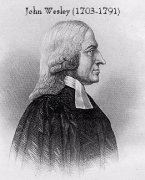 John
Wesley
(1703-1791) John
Wesley
(1703-1791)
This
year is the 300th anniversary of John Wesley’s birth.
The
Wesleyan Exhibition presents a small sampling of the works of John Wesley
drawn from VictoriaUniversity’s Wesleyana Collection. The letters and artifacts are from the United Church Archives located
in the Birge-Carnegie building on the Victoria campus.
John Wesley was born on June 28, 1703 at Epworth, England, the fifteenth of nineteen children of Samuel and
Susanna Wesley. John received
his early education at Charterhouse school and entered Christ Church College, Oxford University in 1720. He was ordained deacon
in 1725, and priest in the Church of England
in 1728. In 1726, he was elected
a Fellow of Lincoln College and lectured in Greek and New Testament
Studies. Between 1727 and 1729, he assisted his ailing
father at Epworth, but returned to Oxford at the insistence of the authorities, where he joined
his brother Charles and several other young scholars in the Holy Club
– a discussion group interested in holy living, charity and theological
inquiry.
In 1733, he published a book of prayers for each day
of the week, and in 1735, published an edition of Thomas A. Kempis’,
Imitation of Christ, thus beginning
a publishing and writing career that spanned half a century.
After the death of his father in 1735, John accepted
the chaplaincy in the Colony of Georgia and that same year left with
his brother for the Americas. With his
knowledge of French, German and Spanish, his mission went well beyond
the English settlers in the colony.
He translated several German hymns and published a hymn book
in Charleston in 1737. However,
Wesley’s high-church stance and an unfortunate love affair forced him
to leave Georgia and return to England in 1738.
On May 24, 1738, John Wesley had a major conversion experience at
Aldersgate in London which stimulated a renewed interest in holy living, and
his trust in personal salvation – “By grace are you saved through faith”. His study of Moravian and Arminian
theology, as well as the Bible and the Church Fathers, further strengthened
this trust.
In 1739, Wesley began what became a Methodist hall
mark – field preaching. Many
Church of England churches were closed to Methodist preachers and Wesley
followed George Whitefield’s example and preached to the miners near
Bristol. For fifty
years Wesley preached throughout Great Britain in chapels, collieries and farmer’s fields, stirring
an unimagined religious revival. Denouncing
both Anglican formalism and Presbyterian exclusiveness, he redirected
Protestantism throughout the English-speaking world.
In 1744, he called together preachers committed to
the Wesleyan revival and organized the first annual conference to forge
strategy and establish a discipline for the Methodist Society.
After his death this conference continued to rule the church
organization under the leadership of the Legal One Hundred.
During his lifetime, Wesley would not permit the society to form
a church distinct from the Church of England or to hold services which
competed with Anglican worship. An exception was made in America however, to meet the specific circumstances of post-revolutionary
conditions. In 1784, Wesley ordained
Thomas Coke as Superintendent for North America with power to ordain other bishops and priests.
At Christmas in 1784, Coke established the Methodist Episcopal
Church in Philadelphia and this church oversaw Methodist missions in both
the United
States
and what would later become Canada.
Over
his long career, Wesley published hundreds of volumes of sermons, correspondence,
journals, hymns and church services.
He also edited and published a fifty volume “Christian Library”
of important theological works. He
edited the Arminian Magazine from 1778 until his death and
continued to write on historical, literary, scientific and theological
topics.
Wesley
founded Kingswood school, helped organize the Sunday school movement,
worked to abolish slavery in the British Empire and the United States. He fought
to improve social conditions of eighteenth century England and to overcome the social immorality of his times.
The bulk of his time, however, continued to be taken
up with constant traveling and preaching.
His life represents an amazing account of service and tireless
activity.
For more information on the life and work of John Wesley or on Methodist
history in Canada, contact:
|
 John
Wesley
(1703-1791)
John
Wesley
(1703-1791)